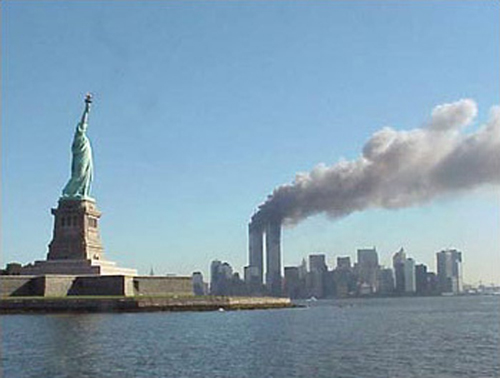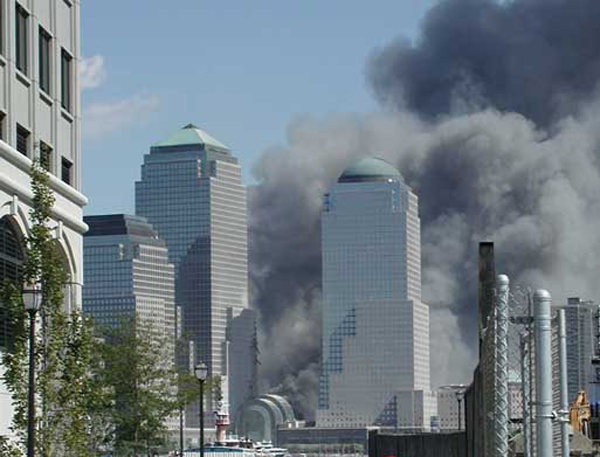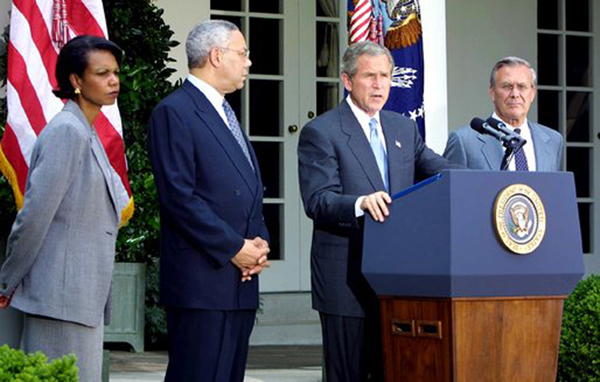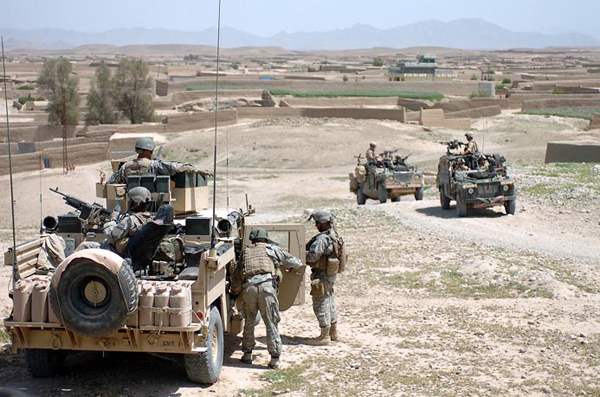SECTION 10
9/11 and the Iraq War
September 11, 2001 attacks in New York City: View of the World Trade Center and Statue of Liberty.
Source: U.S. National Park Service.
The political universe for African Americans, and the entire world, was abruptly altered by the catastrophic events of September 11, 2001. The Al Qaeda terrorist group, a network of radical Islamic fundamentalists, engineered a series of attacks in New York City and Washington, D.C., by hijacking four commercial airplanes. Two hijacked planes struck and destroyed the World Trade Center in lower Manhattan, and a third airplane crashed and destroyed a section of the Pentagon. Americans were stunned by the brutality and scale of these vicious criminal acts. At the World Trade Center alone, nearly three thousand innocent people perished, some plunging over one thousand feet to their deaths. As in previous times of war, the vast majority of Americans, regardless of political party affiliation, immediately rallied behind the president, demanding military retribution against the Islamic terrorists. President Bush characterized the “evil-doers” as both “pathological” and “insane,” and for days following the attacks promised to launch a global “crusade” against Islamic terrorism. To the world’s over one billion Muslims, and to the 6 million Muslims living within the U.S., the term “crusade” instantly evoked disturbing historical images of the Christian invasions of the Islamic Middle East during the Middle Ages. The Bush administration soon quietly discarded its “crusader” rhetoric, but continued to indirectly promote anti-Islamic and anti-Arab sentiment to mobilize the nation for its “War Against Terrorism.” The U.S. military soon invaded and occupied Afghanistan, the nation in which Al Qaeda had established its base of operations under the fundamentalist Taliban regime. In early 2003, U.S. military forces invaded Iraq, which was accused of harboring Al Qaeda terrorists and possessing “weapons of mass destruction” that represented a threat to U.S. national security.
U.S. President George W. Bush (at podium) in the White House Rose Garden on June 24, 2002.
Source: United States Federal Government.
Like other Americans, African Americans were morally and politically outraged by Al Qaeda’s terrorist attacks. Yet they were deeply troubled by the immediate groundswell of patriotic fervor, national chauvinism and numerous acts of violence and harassment targeting individual Muslims and Arab Americans. They recognized that behind this mass upsurge of American patriotism was xenophobia, ethnic and religious intolerance, that could potentially reinforce traditional white racism against all people of color, particularly themselves. They questioned the Bush administration’s “Patriot Act of 2001” and other legal measures that severely restricted Americans’ civil liberties and privacy rights. For these reasons, many black leaders sought to uphold civil rights and civic liberties, and challenged the U.S. rationale for its military incursions in both Afghanistan, and later Iraq. Norman Hill, an African-American labor leader, observed in the New Pittsburgh Courier: “Threatening or attacking people because of their ethnic or religious background helps the terrorists by dividing the country. African Americans should remember this: after 300 years of oppression and discrimination, we are making progress in taking our full place in American society, thanks to the struggles of the Civil Rights Movement. . . .The last thing we want to see is a revival of hatred and discrimination based on race, ethnicity, religion or nationality.”
As the U.S. Justice Department began to arrest and hold without trial hundreds of Muslims and Arab Americans, Islamic groups urgently appealed to the NOI, NAACP and the Congressional Black Caucus for assistance. Approximately 40 percent of the U.S. ’s Islamic population is African American, and hundreds of native-born blacks, because of their religious affiliations, also found themselves under surveillance or were arrested, despite having no links to terrorist groups.
In March, 2003, when the U.S. military invaded Iraq, only 44 percent of African Americans favored the war. The long-term catastrophe of the terrorist attacks of September 11, 2001, from the perspective of the Black Freedom Movement, was two-fold. The U.S. military invasions of Afghanistan and Iraq had greatly eroded domestic civil liberties and civil rights, creating an environment of ethnic/religious hostility, permitting indiscriminate police surveillance, racial profiling and arrests. Tens of thousands of young African Americans in the armed forces were stationed in war zones, fighting a conflict that most blacks strongly opposed. As in Vietnam, African American soldiers once again found themselves on the front lines in disproportionate numbers.
Second, in terms of racial policy, the intense national debate over “black reparations” was derailed, perhaps for decades to come, beneath the tidal waves of patriotism and American xenophobia. The racial reality was that American state power had partially redefined the “racialized Other” as Arab American, Muslim and/or undocumented immigrant. The national “War On Terror” only reinforced the authoritarian dynamics of intolerance and exclusion that preserved white power.
Related Resources
September 11, 2001 attacks in New York City: View of the World Trade Center and Statue of Liberty.
Source: U.S. National Park Service.
September 11, 2001 attacks as seen from Jersey City.
This photo was taken about 3 hours after the twin towers collapsed.
Source: Aspersions.
U.S. President George W. Bush (at podium) in the White House Rose Garden on June 24, 2002.
U.S. President George W. Bush (at podium) discusses his plan for peace in the Middle East as National Security Advisor Condoleezza Rice (left), Secretary of State Colin Powell (center) and Secretary of Defense Donald Rumsfeld (right) stand by his side in the White House Rose Garden on June 24, 2002.
Source: United States Federal Government.





